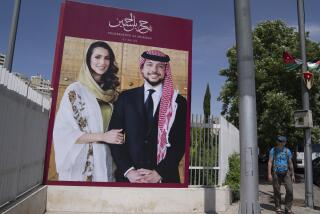A Bit of Royal Intrigue Comes to the Desert
- Share via
PALM DESERT — Albert Alexandre Louis Pierre Grimaldi, His Serene Highness, Sovereign Prince of Monaco, confirmed Thursday that he had partaken in a centuries-old tradition among European monarchs: He has fathered a second child out of wedlock, this one the ponytailed daughter of a former waitress who lives in this upscale enclave near Palm Springs.
Thirteen years after the mother first made a paternity claim against Prince Albert II, nine years after his father suggested that he needed a bride before he could ascend the throne, and a year after he took the throne as a bachelor anyway, his lawyer issued the confirmation to a French newspaper.
In Thursday’s Le Figaro, lawyer Thierry Lacoste said the prince “officially recognizes a paternity that was legally established a few weeks ago.” A Royal Palace official said the prince would make no public statement until he returned from a trip taken outside his monarchy. A copy of the girl’s birth certificate, obtained Thursday, lists Albert as the father.
Albert’s daughter is 14-year-old Jazmin Grace Rotolo, an honor student at St. Margaret’s Episcopal School, a cluster of sand-colored stucco buildings shaded by palm trees in this town 13 miles outside Palm Springs -- far from Albert’s posh Mediterranean playground for the famous and the merely beautiful.
Although she could receive a share of the prince’s fortune, which has been estimated at $2 billion, she will not join the line of succession to the throne, because Monaco’s constitution requires that its rulers be the products of formal Roman Catholic unions.
Jazmin Grace’s mother, 44-year-old Tamara Jean Rotolo, could not be reached for comment.
Rotolo, who comes from a working-class background, apparently met Albert in 1991 while vacationing in the Cote d’Azur region of France, near Monaco, according to press reports in Europe. Rotolo, currently a real estate saleswoman, filed a lawsuit in 1992 alleging the prince’s paternity and seeking child support, but a Riverside County Superior Court judge dismissed it on jurisdictional grounds.
Rotolo filed a malpractice suit in Los Angeles against her attorney in 2001, alleging that he failed to advise her that she should have filed the paternity suit in Monaco before 1994 to maintain her legal rights. In that case, Rotolo said she had married David Shumaker of Palm Desert in 1987, and that the couple separated in 1990 and their divorce was final in 1992, court records show.
In Palm Desert, an affluent area peppered with gated communities and luxury stores, the news was met, alternately, with astonishment and apathy.
“You have got to be kidding. That’s hysterical,” said Maureen Hagen, 67, a resident in the Ironwood Country Club, where neighbors said Jazmin Grace and her mother live.
At St. Margaret’s, a scrum of media waited for Jazmin to leave school as drivers zoomed by on Highway 74, shouting, “Leave her alone!” and “You jerks!”
At a nearby tobacco shop, salesman George Salas -- perched near the head-shot photos of famous customers, including Joe Pesci and Frank Sinatra -- was unimpressed. With so many celebrated faces in town, Salas said with a shrug, “what’s a princess?”
The acknowledgment from the 48-year-old prince, who has never married, is the latest turn in the oversized legend of Monaco, where its renown often seems to come in the form of corruption, scandal, indulgence and tragedy.
With a land mass of about three-quarters of a square mile, Monaco is home to little more than 32,000 people, making it smaller than the city of Palm Desert and one of the smallest independent states in the world.
But it is a storied romper room for the wealthy, at the junction of the Alps and the sea, where James Bond played baccarat at the glamorous casino, and where the wealthy flock to see the annual Formula One: Monaco Grand Prix, which some enthusiasts call the greatest motor race in the world.
In 1956, it also became a fanciful American outpost of sorts when actress Grace Kelly married Monaco’s Prince Rainier III.
Kelly became an honest-to-goodness princess and, amid speculation that Monaco’s independence and stature would falter without an heir to the throne, gave birth to three children: Princess Caroline, Princess Stephanie and Albert.
Kelly was killed in a car crash in 1982; she is interred in the royal crypt in Monte Carlo, where her husband’s remains were interred after his death in April 2005, by which time he had become Europe’s longest-reigning monarch.
At first blush, the revelation might seem a thorough embarrassment to Monaco, which is, at least on paper, a somber and devout country.
Albert, after all, was supposed to be the sturdy child. Stephanie, in particular, has long gallivanted across Europe, enmeshing herself in a slew of relationships: with an elephant trainer, a Portuguese trapeze artist and even, reportedly, the help at the palace.
Also, Albert declared upon taking the throne last year that he would make it a priority to clean up Monaco’s reputation.
The effort has seen some success; Albert has stressed ethics and Monaco has launched a series of fraud investigations, belying its reputation as a tax shelter and a haven for corruption.
But this is the second time in less than a year that Albert has acknowledged paternity; last summer he conceded he had fathered a son with a flight attendant from Togo.
Lacoste, Albert’s attorney, suggested that the prince had shielded Jazmin Grace’s identity to protect her, an effort thwarted in recent weeks by a flurry of press coverage in Europe and a swarm of paparazzi descending on the California desert.
But author Eleanor Herman, who has written extensively about the sexual escapades of royalty, doesn’t buy it. More likely, she said, is that Albert’s shielding was to avoid scandal and his father’s wrath.
Centuries ago, monarchs including King Henry IV and King Charles II were renowned for their ability to produce illegitimate children -- those two were believed to have 22 between them -- because the broods were seen as evidence of virility. That has diminished with changing morality and the rise of tabloid journalism.
“I don’t care whether he’s done it or not. But this stiff-lipped, prudish way of handling it is disturbing,” said Herman, whose latest book, “Sex With the Queen: 900 Years of Vile Kings, Virile Lovers and Passionate Politics,” was released last month. “It’s not like he has a wife who would be publicly humiliated if this came out.”
Arturo Beeche, publisher of the bimonthly European Royal History Journal and an ardent royalist, said he was aghast at word of Albert’s dalliance. Monarchies exist because of heredity and continuity, he said, and he called it appalling that a monarch would shirk his duty to produce legitimate heirs while producing illegitimate children.
“Let’s not be prudish about things,” he said. “But Albert ... should have kept in mind that he’s not ruled by the same laws that govern the rest of us.”
The Palm Desert country club where neighbors said Jazmin Grace and her mother live is situated on 800 acres with “down-valley views,” according to its website. Homes listed on the site range from $359,000 condominiums to $2-million-plus estates with built-in espresso machines and Sub-Zero wine refrigerators.
Palm Desert resident Junelle Pearson, 64, stirring coffee at her local Starbucks, said, “I think it’s really very, very becoming of him to recognize the little princess.”
“We have a lot of royalty in many different ways,” she said. “She’s going to add another dimension to that.”
At Jazmin’s school, a clump of news reporters huddled in front of the school as four Riverside County sheriff’s cruisers and two motorcycle officers kept them at bay. Head of School Barbara Gibson said the media presence had not disturbed students, but one parent expressed frustration with the attention.
“The girl and the school deserve privacy,” said the parent, Lynn McKendry.
Until now, Jazmin Grace has lived a quiet life out of the spotlight, but still made the local newspaper, the Desert Sun, as a winner in a school science fair and for making the honor roll.
At 3 p.m. Thursday, Jazmin walked through the school’s front doors accompanied by a security guard from the firm of security expert Gavin de Becker of Los Angeles. A petite girl, she wore a navy blue, short-sleeve polo shirt and a knee-length khaki skirt. Her light brown hair was in a ponytail.
Without looking at photographers, Jazmin walked quickly to a waiting black Lincoln Navigator. The SUV pulled to a nearby stoplight. Jazmin waved reluctantly from the back seat, through tinted windows, as reporters called her name. Then the vehicle sped away, escorted by two sheriff’s motorcycles.
Wes Young, 67, a Palm Desert retiree, snapped pictures of the spectacle earlier Thursday; he said he was interested because he visited Monte Carlo in 2004 for a Grand Prix race while celebrating his 10th anniversary with his wife, JoAnn.
“This young girl’s life will probably change forever,” he said.
Times staff writers Lisa Richardson, Cynthia H. Cho and Jonathan Abrams contributed to this report.
More to Read
Sign up for Essential California
The most important California stories and recommendations in your inbox every morning.
You may occasionally receive promotional content from the Los Angeles Times.















